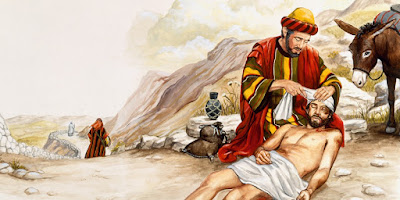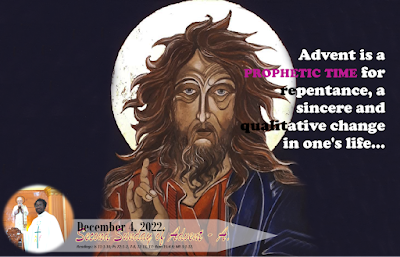My good Samaritan: “Go and do likewise.”
July 14 2019: Fifteenth Sunday in Ordinary Time
A Yiddish
proverb says, “If you ever need a helping hand, you'll find one at the end of
your arm.”
Everyone will like others to be good to him. We always expect a lot of goodness, kindness, love and benevolence from others. Are we doing the same to them? Don’t ask your brothers to be your good Samaritans. You strive to be the good Samaritan to them.
Everyone will like others to be good to him. We always expect a lot of goodness, kindness, love and benevolence from others. Are we doing the same to them? Don’t ask your brothers to be your good Samaritans. You strive to be the good Samaritan to them.
The only way to measure how one’s loves God is to see how he
or she loves and relates to his fellows. The Apostle stated in 1 John 4:20, “If
someone says, ‘I love God,’ but hates a fellow believer, that person is a liar;
for if we don’t love people we can see, how can we love God, whom we cannot
see?”
Our love of God is translated and will be assessed only
through our attitude and relation towards others. Religiosity and the genuine
religion are not a mere belonging to a group or about coming ten times to
church during a day. It is a way of life which affects the whole being,
internal as well as external. The true religion is a religion of love and not of
stingy faithfulness to a canon or to laws and regulations. Many are those who
sing their love of God in between four walls of a building called church. Every
Sunday, they adorned beautiful garments and special perfumes and fill churches,
sanctuaries and shrines. But their life from Monday to Saturday is in perfect
disconnection from what they profess. They feel no concern for no one and are indifferent
to the fate of others.
Today’s liturgy comes to teach us about religiosity and
about how-to live-in accordance to God’s will. The story of the Good Samaritan
is a special call the Lord addresses to each one of us.
Actually, we live in a world in search of orientation. Not only
that we have a shallow knowledge of what is good and hardly make the difference
between the good and bad, or right and wrong. But also, we are humanly more
prompted to do evil than to do good. In many societies and countries today, it
is cheaper to kill than to protect life. One can easily, without any inner
disturbance, harm others and think it is the right thing to do at the present
moment. In many houses and communities, we prefer to pay to throw remaining
food away, than to give to starving people nearby. To do good seems to be a
feat, a miracle. It makes you a herald, a super hero. And regrettably, our
world is in thirst for super hero, people of good.
What we pray for in today’s liturgy is clearly expressed in the
collect: “O God, who show the light of your truth to those who go astray, so
that they may return to the right path, give all who for the faith they profess
are accounted Christians the grace to reject whatever is contrary to the name
of Christ and to strive after all that does it honor.” We are urged to
differentiate the good from the evil and to chose to be people who walk in the
right path, because of the faith we profess.
To help us in our journey toward goodness, the readings of
this 15th Sunday of the year C are all calling us for actions. Moses,
in the first reading exhorts the children of Israel to obey to God’s voice and
live according to his commandments and statutes. Obedience, we read, is called to
be a deep adherence to God with one’s whole life, that is heart and soul. The Law
of the Lord, his commandments are not hard to follow and not strange to us if
we make them part of our lives. Thus, the recommendation of Moses to the Israelites,
see the Law as “something very near to you, already in your mouths and in your
hearts; you have only to carry it out.”
That Law of the Lord, nevertheless, must not be simple words
on which one must meditate. It must become part of one’s life and lead his
actions. Hence, Jesus gives us the mythic and well-known parable of the Good
Samaritan.
The background of this parable, Jesus is challenged by a
Jewish lawyer. We read that a scholar of the Law came to Jesus and wanted to
test him with a question: “Teacher, what must I do to inherit eternal life?” By
itself, the question is genuine and relevant. We all thirst for eternity, for
life with God. God even made us for that purpose, to be with him. But the one who
puts that question is supposed to know the better what to do. He is a lawyer,
teacher to others. Thus, Jesus sends him back his question, “What is written in
the law? How do you read it?” Ancients philosophers say, he who puts a question
has 50% of the answer. He just wants to confirm what he already knows and bring
it to the 100%. The scholar of the law proved it true by his answer: “You shall
love the Lord, your God, with all your heart, with all your being, with all
your strength, and with all your mind, and your neighbor as yourself.”
After this, will come the greatest and more concrete
question, “And who is my neighbor?” It is actually the heart of the Lord’s
teaching. It is not about sheer knowledge of what to do, but do I do it and to
whom to do it? Who is your neighbor? We have here the actualization of the
commandment of love.
We said before, that we all want people to be good to us. We
have in great esteem those who are good. But do we try ourselves to be good to
others? The parable of the Samaritan and the victim of the robbers teaches us
that our neighbor is everyone in need, anyone we can help. The neighbor is every
person going through any kind of difficulty. Our world is overflowing of people
we meet in need of help, people victims of the system, victims of politics robbery,
victims of injustice and corruption, victims of the society and sadly, our own
victims. To them we are urged to be good Samaritans.
Unfortunately, more that often, we behave just like did the
priest and the Levite. We see people suffering, we see beggars in our streets,
we meet people in hospitals, just in need of comforting words or a hand, a
basic need, and we pass by, keeping far away our eyes, avoiding to be contaminated
or sully by them. We priests, church leaders and church goers are not exempted.
We accuse politicians of implementing politics and systems that create more
misery and poverty. But we do nothing to uplift people from their poverty. The Good
Samaritan is not always others. Could you try to be one to them?
As people imperfect and disturbed by sin, let us
make it our task and challenge to be good and to do good to all. Our love for
God must become concrete action of love towards our suffering brothers and
sisters, those who are marginalized and forgotten by the society. Let us not
lose in mind these last words of Jesus to the scholar of the Law, “Go and do
likewise.” He addresses them as well to us. Because, the only way we can afford
eternal life for ourselves is in doing good. As says St. Luigi Orione, “Do good
to all, do good always. Evil never to none.” Jesus made himself our neighbor,
our good Samaritan, he who was in the form of God so that we too might become
the good Samaritans to each other. So, “Go and do likewise.”




Comments
Post a Comment